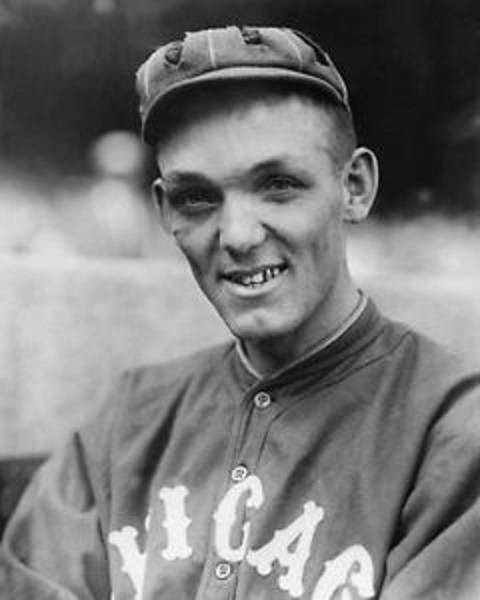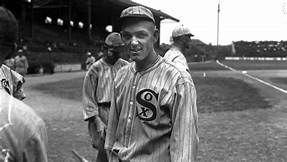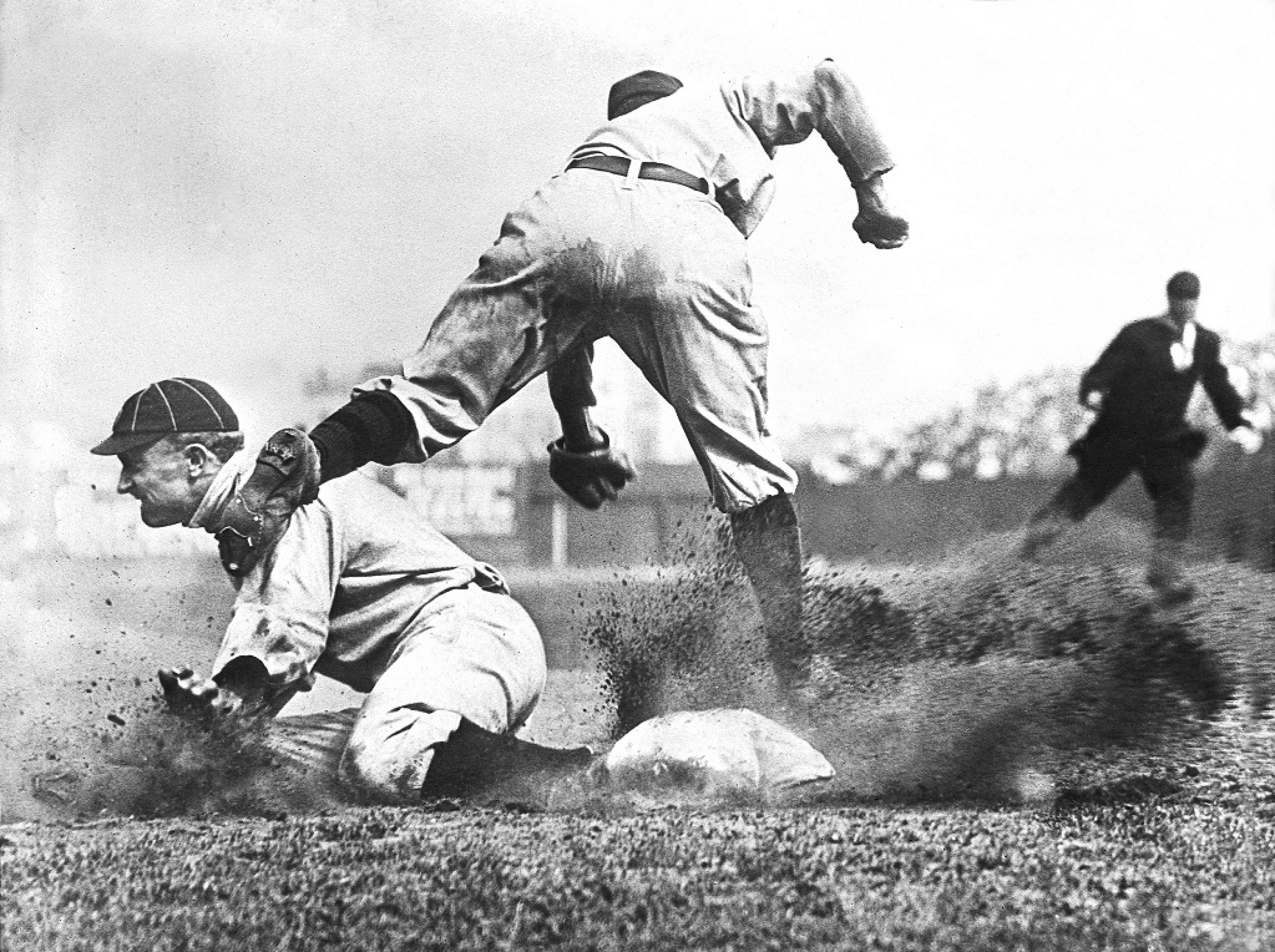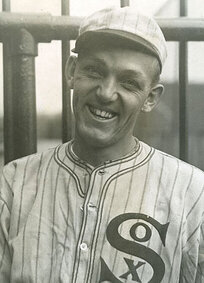Featured Panoramic Photo Above:
Classic Charles Conlon photo of Ty Cobb sliding into Jimmy Austin
Baseball History Comes Alive Now Ranked As a Top Five Website by Feedspot Among All Baseball History Websites and Blogs!
(Check out Feedspot's list of the Top 35 Baseball History websites and blogs)

Guest Submissions from Our Readers Always Welcome! Click for details
THE BASEBALL HISTORY COMES ALIVE BLOG
Please note: As we compose new blog entries, we will now send each one out to all our subscribers as we post them. Here’s a link to see the entire Blog Archives -GL
September 14, 2022
Today I’ll continue with my weekly “deep dive” into the 1919 Black Sox scandal with a look at the sentence handed out to Buck Weaver. This essay, along with all the others I’m posting in this series, originally appeared in my book, Reflections on the 1919 Black Sox: Time To Take Another Look, available on Amazon.
Was Buck Weaver Treated Fairly by Judge Landis?
“Buck Weaver simply loved to play ball. Why he’s got a smile on his face all the time, no matter what is happening. Buck is just as much a kid today as he was when he first came to the White Sox in 1912. Weaver never gives up.” -Kid Gleason
If there is a case to be made for reinstatement of any of the “Eight Men Out” banned for life by Judge Landis in the aftermath of the 1919 Black Sox scandal, it would be for Buck Weaver. Certainly much can be said for Shoeless Joe Jackson who played flawlessly in the field and led all batters with a .375 average. But unfortunately for Jackson, his grand jury statement, reported as a “confession,” and his acceptance of tainted money—whatever innocent explanations there might be—forever made his later claims of innocence much harder for even his most staunch supporters to explain away.

In the case of Buck Weaver, there are no such obstacles. There was no confession, no acceptance of money. In addition, none of the “Seven Suspicious Plays” recorded by sportswriter Hugh Fullerton involved Weaver. There has never been any suggestion that he gave less than one hundred percent the entire Series, hitting .324 (11-43), and fielding flawlessly. His play was so solid and inspirational that it prompted this appraisal from Cincinnati sportswriter Ross Tenney, hardly an unbiased observer, shortly after the Series ended:
“Though they are hopeless and heartless, the White Sox have a hero. He is George Weaver, who plays and fights at third base. Day after day Weaver has done his work and smiled. In spite of the certain fate that closed about the hopes of the Sox, Weaver smiled and scrapped. One by one his mates gave up. Weaver continued to grin and fought harder….Weaver’s smile never faded. His spirit never waned….The Reds have beaten the spirit out of the Sox all but Weaver. Buck’s spirit is untouched. He was ready to die fighting. Buck is Chicago’s one big hero; long may he fight and smile.”
So just why was Buck banned? As the conventional wisdom tells us, Buck apparently either sat in on one or two early meetings where the conspiracy was first hatched; or at some point was informed of the plan. But he never consented to it, never agreed to participate, and only possessed “guilty knowledge,” in the famous words of Judge Landis.

Put simply, he declined to squeal on his teammates. Perhaps this decision can be most easily explained by the fact he was apparently threatened with physical violence by Gandil and Risberg if he ratted on them, two guys the 5’11”, 170 pound Weaver understandably didn’t want to cross.
For keeping quiet, Buck was lumped in with the others and received the same “one-size-fits-all” lifetime ban from Landis. Was he the only one who had prior inklings of a fix? That seems hard to believe, but he became a convenient scapegoat. Gene Carney makes the following point:
“Landis, by keeping the focus on a minimum number of players [including Weaver], was doing exactly what the owners (especially Comiskey, who had a large hand in hiring Landis) wanted. Baseball’s image would suffer no more than it had already. Management’s role, baseball’s role in covering up the ties between the sport and gambling, was not to be explored.”
Sportswriter Hugh Fullerton, who did more than anyone to break the story, once stated that “not fewer than a hundred ballplayers had information that something was doing when the Series started.”
Here’s what Buck had to say about his so-called “guilty knowledge”:
“The only doubt in my mind, was whether I should keep quiet about it or tell Mr. Comiskey. I was not certain just what men, if any, had received propositions or whether they had accepted. I couldn’t bring myself to tell on them even had I known for certain. I decided to keep my mouth shut and play my best.”
This nicely makes my point that there were different levels of involvement in this sordid affair. Should Weaver have received the same sentence as those who actively conspired with gamblers to throw the Series, took money, and may have thrown games? I hardly think so, and neither did many others. From our vantage point one hundred years later, it seems that a suspension, possibly for a year, would have been a far more appropriate sentence.
Fixer Abe Attell always maintained Weaver was guiltless, and once tried to persuade Landis to reinstate him. “The kid didn’t get a dime out of it, and he didn’t know what was going on, either.” Writer Damon Runyon once interceded with Landis on Buck’s behalf, but was rebuffed with the same “guilty knowledge” assertion.
Here’s other observations:
Nelson Algren: “The verdict we once applauded as one of Olympian sagacity was nothing more, it has become plain, than a legal mugging by an enraptured Puritan. Weaver is punished ruthlessly while the silence of Comiskey with equal knowledge of corruption, deserved only praise.”
James T. Farrell: “The two players I have sympathy for are Weaver and Joe Jackson. They were brought up in an environment where you were not supposed to squeal. What could they have done?”
Buck Weaver applied for reinstatement six times before his death in Chicago on January 31, 1956, at age 65. He was the third of the banned Black Sox to pass away, following Joe Jackson in 1951 and Fred McMullin in 1952. One notable but failed attempt occurred in the wake of the Tris Speaker/Ty Cobb betting scandal. Later in life, Weaver contacted a New York attorney who claimed he could get him reinstated. Buck sent him his legal papers but they were never returned and their whereabouts are unknown to this day.
In Burying the Black Sox, Gene Carney summarizes the plight of Buck Weaver, citing one of the saddest of baseball documents, which is on display at the National Baseball Museum in Cooperstown—a letter from Buck Weaver to Commissioner Ford Frick in 1953:
“At age sixty-three, (he would die three years later), Buck was still trying to clear his name with Major League Baseball. He insisted that he ‘knew nothing’ and ‘played a perfect Series.’ When he sued his team, after he was banned from baseball, contending that he deserved the pay for the last year of his contact (1921), he won, which proved in Buck’s view that he was right and Comiskey was wrong.”
Chicago Tribune columnist Mike Downey wrote a column in 2005 calling for Weaver’s reinstatement. He cited catcher Ray Schalk’s insistence that there were actually only seven players involved, excluding Buck. In recent years, several members of Weaver’s family, including nieces Pat Anderson and Marjorie Follet took up the case for their uncle’s reinstatement. They made unsuccessful appeals to then-commissioner Bud Selig. Both have since passed away.
The torch has fallen to a new generation of the Weaver family, grand-nieces Debra Ebert and Sandy Schley. Both appeared at a recent symposium on the Black Sox scandal sponsored by the Chicago chapter of the Society for American Baseball Research (SABR).
To answer my original question: Was Buck Weaver treated fairly by Judge Landis? Sadly, I have to conclude the answer is no. Let’s hope a future commissioner will see the harm done to the reputation of this fine ballplayer and correct an egregious injustice.
(Stay tuned for next week’s essay: “Chic Ganddil Tells His Side of the Story.” You won’t want to miss it!)
Gary Livacari
As always, we enjoy reading your comments
Here’s a link to see the entire Blog Archives



Great article. I’m reading Carney’s book right now. It’s opening my eyes on the cahoots of the cover up by the heads of baseball, which, IMHO is worse than the players throwing the series.
Thanks Ralph. I became friends with Gene Carey in the last year of his life. I think his book is must reading for at least a basic understanding of the Black Sox scandal. I agree with all of Gene’s conclusions, e.g., that the conventional “Eight Men Out” version is extremely superficial, largely bogus, and doesn’t tell the entire story. I also agree with his assertion that there were different levels of guilt and the punishments should have reflected that, Weaver being Exhibit A.
Gary…..Again, another outstanding excerpt of the 1919 scandal and the “Reflections…” book. In what I have read about this, I would have to agree with the assessment that WSox management {and probably the majority of MLB owners} attempted (and succeeded) in minimizing their prior knowledge of this particular incident and many other wagering schemes during that era. I hope that some logical and objective Commissioner in the future {it won’t ever be that knucklehead, owners puppet, Manfred} will re-instate Buck Weaver to his rightful, semi-respectful place in MLB history. Like a witness to a homicide; who says he has no knowledge of said crime, he was merely “guilty by association”, but; however was still culpable, although to a lesser degree than the others who actually conspired and participated with the gamblers. A forever sad saga in MLB lore.
Thanks Tom, you’ve stated my points perfectly!
The fact of the matter is that there was a LOT of gambling that was associated with baseball back then. There still is today. Sports gambling in the USA accounts for literally hundreds of $billions of ‘action’ every single year, and baseball, due its long season and numerous teams, has more action than any other sport.
I can’t recall who said it, but it was said long ago; ‘never bet on anything that can talk,’ and I think that holds true for today as well.
In my opinion, Landis was a ‘show judge’ that was used to save the reputation of baseball at the expense of these sacrificial lambs. I doubt that Baseball will ever reinstate any of these players, including Pete Rose.
I agree with all that Ray, thanks!
To Gary, Thomas and Ray: Ditto, and Amen!
Michael
Thanks Michael.